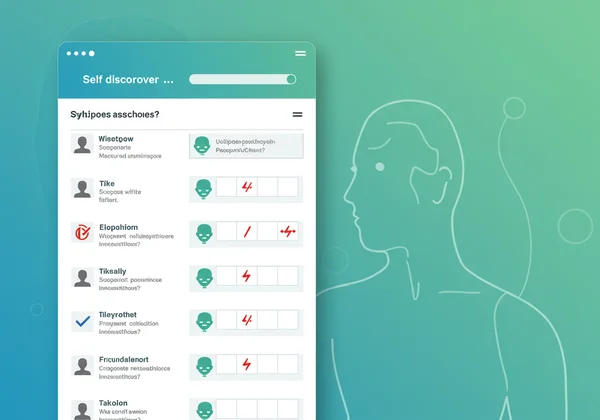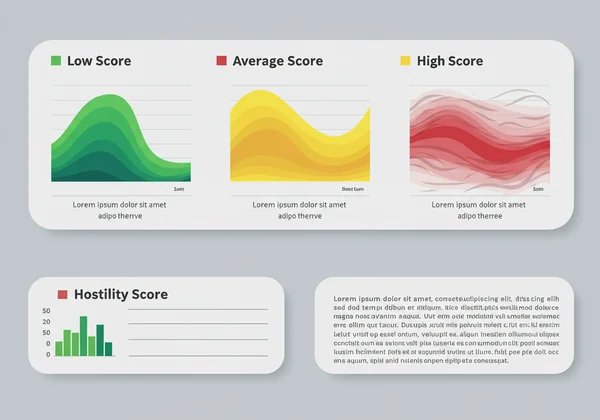Test di Ostilità SCL-90: Comprendi il Tuo Punteggio di Rabbia e Irritabilità
October 11, 2025 | By Marvin Martinez
Ti è mai capitato di sentire un risentimento latente o un'improvvisa ondata di irritazione che sembra spuntare dal nulla? Non sei solo. Comprendere emozioni come la rabbia e l'ostilità è una parte vitale della conoscenza di sé. Se ti sei mai interrogato sull'intensità di questi sentimenti, potresti chiederti: che cos'è il test psicologico? È un modo strutturato per acquisire una comprensione del tuo mondo emotivo. Ad esempio, uno strumento potente come la valutazione SCL-90 può fornire preziose intuizioni attraverso il suo punteggio di "Ostilità". Questa guida decodificherà il significato di tale punteggio, esplorerà i segni comuni di ostilità e ti fornirà strategie per gestire questi sentimenti complessi per una vita più ricca ed equilibrata. Inizia il tuo viaggio di auto-esplorazione facendo un test psicologico gratuito sulla nostra piattaforma.

Cos'è l'Ostilità nella Valutazione Psicologica?
Quando sentiamo la parola "ostilità", spesso immaginiamo un'aggressione palese o discussioni accese. In psicologia, tuttavia, il termine è molto più ampio e sfumato. Non si tratta solo di ciò che fai, ma anche di ciò che pensi e provi. Un test psicologico della rabbia aiuta a misurare questi schemi sottostanti. Comprendere questa dimensione è il primo passo verso una maggiore consapevolezza e controllo emotivo.
Definire l'Ostilità: Più di Semplice Rabbia
Mentre la rabbia è una componente fondamentale, l'ostilità è una risposta emotiva più complessa e duratura. Pensala come una triade di elementi interconnessi:
- Componente Affettiva (Il Sentimento): Include sentimenti di rabbia, irritazione, fastidio, risentimento e disgusto. È il calore emotivo che ribolle sotto la superficie.
- Componente Cognitiva (I Pensieri): Implica avere una visione cinica, diffidente o critica degli altri. È la convinzione che le persone siano generalmente inaffidabili, ingiuste o motivate da intenzioni egoistiche.
- Componente Comportamentale (Le Azioni): Può variare da azioni sottili come impazienza e maleducazione a comportamenti più manifesti come discussioni verbali o aggressione fisica.
A differenza della rabbia, che è spesso una reazione temporanea a un innesco specifico, l'ostilità è più simile a una lente persistente attraverso cui vedi il mondo. Un test psicologico online può aiutarti a capire quanto sia forte quella lente.
Segni Comuni: Aggressività, Risentimento e Irritazione
Riconoscere l'ostilità in te stesso può essere difficile perché spesso diventa un modo predefinito di reagire. Il test SCL-90 aiuta a identificare pensieri, sentimenti e impulsi caratteristici di questo stato. Alcuni indicatori comuni di aggressività e risentimento includono:
- Irritabilità Frequente: Sentirsi facilmente infastiditi da piccoli inconvenienti o dalle azioni degli altri.
- Cinismo Pervasivo: Una convinzione generale che gli altri non siano affidabili o abbiano secondi fini.
- Propensione all'Discussione: Una tendenza ad avere frequenti discussioni o sentire il bisogno di sfidare le opinioni altrui.
- Aggressione Verbale: Usare sarcasmo, critiche o urla per esprimersi durante i conflitti.
- Impazienza: Una bassa tolleranza per ritardi, errori o la lentezza altrui percepita.
- Portare Rancore: Trovare difficile lasciar andare torti passati e provare un risentimento persistente.
Se questi segni ti risuonano, non significa che tu sia una "cattiva" persona. Significa semplicemente che c'è uno schema emotivo che vale la pena esplorare. Il primo passo è scoprire il tuo punteggio e vedere cosa rivela.
Decodificare il Tuo Punteggio della Dimensione di Ostilità SCL-90
Fare un test psicologico online è un modo fantastico per ottenere dati obiettivi sul tuo mondo interiore. L'SCL-90 è un rispettato inventario di auto-valutazione che misura il disagio psicologico attraverso nove dimensioni sintomatiche primarie, inclusa l'ostilità. Il tuo punteggio fornisce un'istantanea dei tuoi sentimenti nell'ultima settimana, offrendo un chiaro punto di partenza per l'auto-riflessione.
Interpretare i Tuoi Risultati di Ostilità SCL-90
Il tuo punteggio sulla scala SCL-90 riflette la frequenza e l'intensità dei pensieri e dei sentimenti ostili che hai sperimentato di recente. Ecco una guida generale per comprendere i risultati:
- Punteggio Basso: Suggerisce che i sentimenti di rabbia, risentimento e irritabilità non sono una parte significativa della tua esperienza emotiva in questo momento.
- Punteggio Medio: Indica che sperimenti questi sentimenti occasionalmente, il che è una parte normale della vita per la maggior parte delle persone.
- Punteggio Alto: Questo potrebbe suggerire che i pensieri e i sentimenti di ostilità sono frequenti, intensi e probabilmente ti stanno causando un certo livello di disagio o stanno influenzando le tue relazioni e il tuo benessere.
È fondamentale ricordare che un punteggio è solo un numero; non è un'etichetta. È uno strumento per aumentare la tua auto-consapevolezza. Per vedere a che punto sei, puoi fare il nostro test SCL-90.

Cosa Significa un Punteggio Alto sulla Scala di Ostilità per Te
Ricevere un punteggio alto, indicativo di un'ostilità significativa, può essere preoccupante, ma è importante vederlo come un'opportunità di crescita. Può essere una potente motivazione per comprendere le cause profonde. Un punteggio alto potrebbe indicare che stai vivendo uno stress significativo, senti che i tuoi bisogni non vengono soddisfatti o stai lottando con conflitti irrisoluti. Spesso indica la necessità di migliori abilità di regolazione emotiva e modi più costruttivi di interagire con il mondo. Il report personalizzato basato sull'intelligenza artificiale disponibile sulla nostra piattaforma di valutazione psicologica può offrire approfondimenti più dettagliati e specifici per le tue risposte.
Oltre il Punteggio: Modi Pratici per Gestire Rabbia e Irritabilità
Il tuo punteggio non è il tuo destino. È un segnale che ti indica le aree di sviluppo personale. Con uno sforzo consapevole e le giuste strategie, puoi imparare a gestire efficacemente queste emozioni difficili. La gestione attiva dell'irritabilità e dell'ostilità può migliorare drasticamente la tua qualità di vita, la tua salute e le tue relazioni.
Strategie Basate sulla Scienza per Risposte Emotive Più Sane
Sviluppare strategie di adattamento efficaci è fondamentale. Invece di lasciare che la rabbia ti controlli, puoi imparare a gestirla in modo costruttivo. Ecco alcune tecniche basate sull'evidenza per iniziare:
- Pratica la Mindfulness e la Respirazione Profonda: Quando senti la rabbia salire, prenditi un momento per fare una pausa. Concentrati sul tuo respiro, inspirando lentamente attraverso il naso ed espirando attraverso la bocca. Questo semplice atto attiva il tuo sistema nervoso parasimpatico, promuovendo uno stato di calma.
- Sfida i Tuoi Pensieri (Ristrutturazione Cognitiva): L'ostilità è spesso alimentata da schemi di pensiero negativi e distorti. Chiediti: "Questo pensiero è vero al 100%?" o "C'è un altro modo per vedere questa situazione?" Spostare la tua prospettiva può attenuare la carica emotiva.
- Sviluppa una Comunicazione Assertiva: Invece di incamerare la rabbia o esplodere, impara a esprimere i tuoi sentimenti e bisogni con calma e rispetto. Usa affermazioni in prima persona, come "Mi sento frustrato quando...", invece di affermazioni accusatorie in seconda persona.
- Impegnati nell'Attività Fisica: L'esercizio fisico è uno sfogo potente e salutare per la frustrazione e la rabbia represse. Una camminata veloce, una corsa o una sessione in palestra possono aiutare a rilasciare la tensione e migliorare il tuo umore.
Quando Cercare Supporto Professionale per l'Ostilità Persistente
Sebbene le strategie di auto-aiuto siano incredibilmente preziose, a volte abbiamo bisogno di più supporto. Se la tua ostilità ti sembra opprimente, sta danneggiando le tue relazioni, influenzando il tuo lavoro o portando a comportamenti aggressivi che ti causano rimpianto, cercare aiuto professionale è un segno di forza. Un terapista o un consulente può aiutarti a individuare le cause profonde della tua rabbia e a sviluppare strategie personalizzate ed efficaci per un cambiamento a lungo termine. Ricorda, il test psicologico gratuito sul nostro sito è un primo passo, non un sostituto per una diagnosi o un trattamento professionale.

Il Tuo Viaggio di Auto-Comprensione e Crescita
Potenziati con la consapevolezza. Il tuo punteggio di ostilità SCL-90 non è un'etichetta, ma una bussola per l'auto-comprensione. Impegnandoti attivamente con queste emozioni, sblocchi il percorso verso connessioni più forti, stress ridotto e una vita più appagante – un viaggio perfettamente racchiuso nella nostra missione: 'Rendere l'esplorazione più facile, rendere la vita più ricca.'
Pronto ad approfondire la tua auto-consapevolezza? Fai il passo successivo definitivo. Inizia ora la tua valutazione SCL-90 gratuita per ricevere un test con validazione scientifica, arricchito dal nostro report di approfondimento potenziato dall'intelligenza artificiale, e ottenere le intuizioni personalizzate di cui hai bisogno per prosperare veramente.
Domande Frequenti: Ostilità e Rabbia nel Test SCL-90
Cos'è il Test SCL-90 e Come Valuta l'Ostilità?
La Symptom Checklist-90 (SCL-90) è uno strumento di valutazione psicologica ampiamente utilizzato, progettato per valutare una vasta gamma di problemi psicologici e sintomi psicopatologici. Per la dimensione dell'ostilità, ti chiede di valutare quanto sei stato turbato da sentimenti e impulsi specifici, come "sentirsi facilmente infastiditi o irritati", "scatti d'ira incontrollabili" e "impulsi a danneggiare qualcuno". Il punteggio combinato fornisce una misura del tuo stato ostile recente.
Una Valutazione Online dell'Ostilità Può Fornire Approfondimenti Accurati?
Sì, quando la valutazione è scientificamente validata come l'SCL-90. Sebbene nessuno strumento online possa sostituire una diagnosi clinica, un test ben strutturato può fornire intuizioni altamente accurate e preziose sui tuoi schemi emotivi. La nostra piattaforma garantisce l'anonimato e impiega un'intelligenza artificiale avanzata per analizzare i tuoi risultati, offrendo un punto di partenza affidabile per l'auto-riflessione. Puoi provare il nostro strumento gratuito per verificarlo tu stesso.
Cosa Dovrei Fare Se il Mio Punteggio di Ostilità SCL-90 Mi Preoccupa?
Innanzitutto, ricorda che un punteggio non è un giudizio. Vedilo come un'informazione preziosa. Usalo come catalizzatore per esplorare le strategie di gestione menzionate in questo articolo. Ti consigliamo vivamente di discutere i tuoi risultati con un professionista della salute mentale che possa fornirti contesto, guida e supporto personalizzati per la tua situazione unica.
È Possibile Ridurre l'Ostilità e Quanto Tempo Ci Vuole?
Assolutamente. Ridurre l'ostilità è un'abilità che può essere appresa e rafforzata nel tempo. I tempi di cambiamento sono diversi per ognuno e dipendono da fattori come l'intensità dei tuoi sentimenti e il tuo impegno nell'applicare nuove strategie di adattamento. Con uno sforzo costante nell'applicare tecniche come la mindfulness e la ristrutturazione cognitiva, molte persone iniziano a vedere cambiamenti positivi in poche settimane.